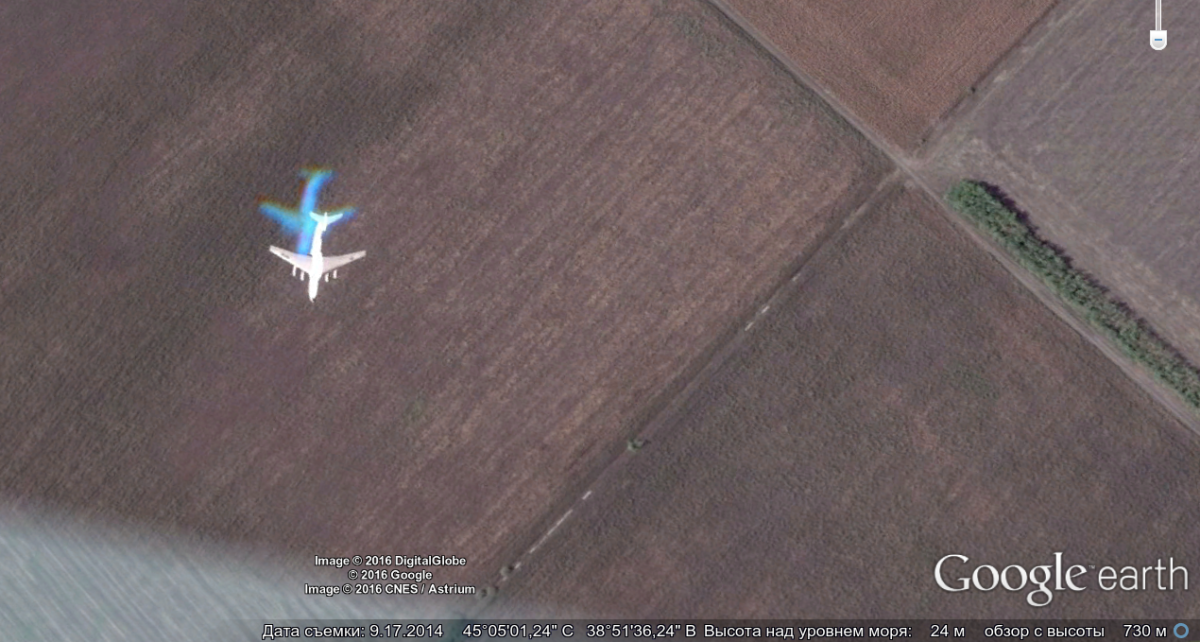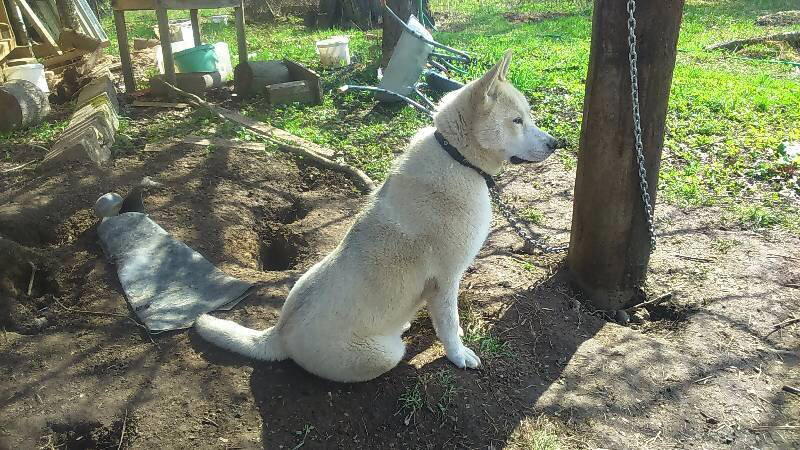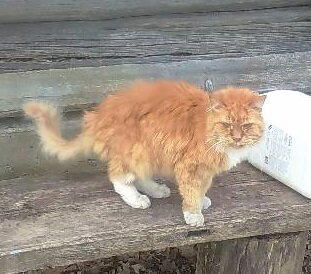Привет из детства

На выезде с дачного поселка увидели на избушке сторожа этого мишку. Отдали за символическую цену.

На выезде с дачного поселка увидели на избушке сторожа этого мишку. Отдали за символическую цену.
Ехал как-то поздно вечером в метро. Был вечер пятницы, вагон довольно полный и публика очень разношерстная. Но среди всех, как новогодняя елка на празднике, выделялся огромный двухметровый трансвестит. Высоченный такой, рослый здоровенный мужик. Одет как женщина, в колготках, даже с эпиляцией вроде. Волосы длинные, макияж, все дела. Выдавали широченные плечи, кадык и строение лица.
И вот едет он такой жизнерадостный, спокойный.
А напротив него едут два типичных гопника. Смотрят они на него и не понимают, что делать. На лицах был мучительный разрыв шаблона. По понятиям что-то сделать надо. А по ситуации – попробуй сделай. Транс трансом, а пиздюлей конкретных может выписать в ответку.
Вобщем, ехали гопники молча и также молча вышли.
И никакой тебе гомофобии. И никакой тебе толерантности
Если в вашей жизни наступил период, когда вам постоянно кто-то ненужный звонит (коллекторы, назойливые недоброжелатели) и у вас нет функции "черный список" и тому подобное, попробуйте сделать следующее (в качестве временной меры):
- сделайте "пустой" файл mp3 в любом муз.редакторе (назовите его, например, как я, "тишина".mp3)
- поставьте на мелодию вызова по умолчанию
- отключите вибрацию
- на действительно важные контакты в вашей книге поставьте нужные мелодии.
- наслаждайтесь звучанием только от тех, кого знаете.
При таком способе вы будете видеть пропущенные звонки с беззвучным звонком и всегда будет на связи для нужных людей.
Спасибо за внимание.
Так вот:
Ребята - если кто такое проходил, или знает.. ДАЖЕ МОЖНО ПО РУССКИ! ПЕРЕВЕДУТ! В общем, вот список заданий:
1. Brief the life and creative work of J. Fowles.
2. Characterize the main characters of Fowles’s novel – “The Collector”.
3. Give detailed analysis of this novel.
1. Brief the life and creative work of R. Bradbury.
2. Characterize the main characters of Bradbury’s novels – “Fahrenheit 451” or “Something Wicked This Way Comes”. Define the main problems in “Fahrenheit 451”.
3. Give detailed analysis of one of the two writer’s novels mentioned above.
1. Brief the life and creative work of J. D. Salinger.
2. Characterize the main characters of Salinger’s short stories – the Glass family.
3. Analyze two of the short stories from “Nine Stories” collection.
1. Give a survey of the British literature of the 21st century, point out the existing in literature trends, underlying their peculiarities.
2. Brief the life and creative work of the most prominent writers of this period (you may as well choose your favorite ones, pointing out why exactly you find this or that author particularly interesting).
3. Characterize British Post-Modernism and the work of the renowned Postmodernists of England.
4. Analyze one of the contemporary British novels to your choice.
1. Give a survey of the American literature of the 21st century, point out the existing in literature trends, underlying their peculiarities.
2. Brief the life and creative work of the most prominent writers of this period (you may as well choose your favorite ones, pointing out why exactly you find this or that author particularly interesting).
3. Characterize American Post-Modernism and the work of the renowned Postmodernists of the United States.
4. Analyze one of the contemporary American novels to your choice.
1. Analyze the impact of Russian writers (A. Pushkin, L. Tolstoy, I.Turgenev, A. Chekhov and others) on the creative work of foreign authors.
2. Find facts and examples to prove the impact of some foreign writers on the creative work of certain Russian authors (Aesop, Eskhil, Sophocles, Shakespeare, Zolya, Byron, Goethe, L. Carroll, etc.)
3. Brief the creative work of the Russian emigrant-writers (I. Bunin, V.Nabokov, I Smelyov, I. Brodsky, etc.)
1. Point out (briefly) the general characteristic features of the British drama of the first half of the 20th century (B. Shaw, J. Galsworthy, S. O’Casy, S. Maugham, J. B. Priestley, S. Beckett, etc.)
2. Give a detailed analysis of the language and the problems presented in B. Shaw’s and J. B. Priestley’s plays.
3. Outline (briefly) the English drama of the second half of the 20th century; characterize the major themes touched on in the works of the leading playwrights.
4. Give a brief but critical description of the creative work of the playwrights (J. Auden, E. Bond, J. Osborne, H. Pinter, T. Stoppard, etc.) concentrating your attention on the major play of one of the authors.
1. Characterize British poetry of the 20th century and the problems touched on in their poetic works.
2. Speak on the life and creative work of any British poet of the 20th century paying a closer attention to one of his major works.
3. Study the realistic and experimental features of the British fiction of the final period of the 20th century.
4. Characterize the creative work of Ch. P. Snow and analyze the problems, language and style of one of his novels.
5. Summarize the criticisms about M. Spark, G. Fowls, Ph. Larkin.
1. Outline the origin of the trend in the English literature and the problems the authors put forward in their works (D. Osborn, A. Silltoe, D. Braine, and others).
2. Speak on the life and creative work of K. Amis. Analyze the problems presented in his novel “Lucky Jim”.
3. Outline the main features of the anti-colonial novel in the English literature and the contribution of the leading authors of the trend.
4. Brief the life and creative work of J. Aldridge and speak on the problems of the novel “The Diplomat” or of another one.
1. Explain the meaning of the terms “modernistic”
21:02:57
and “postmodernistic”; speak on the main principles of this trend in literature and outline the problems the modernistic writers put in their creations.
2. Analyze the creative work ether of J. Joyce, T. Eliot, V. Woolf or D. Laurence, O. Huxley, D. Lindsay.
3. Speak on the existential features of English fiction and the main representatives of this trend.
4. Brief the life and creative work of W. Golding, paying more attention to the novel “Lord of the Flies” and its existential features.
1. Give a brief outline of the British novel and the short story of the early 20th century, pointing out the trends and problems discussed by the authors.
2. Characterize (briefly) the life and creative work of Th. Hardy, S.Maugham, E. Morgan, R. Aldington, giving more facts about their best compositions.
3. Speak on the realistic features in G. Galsworthy’s trilogy “The Forsyte Saga” giving a more detailed analysis of “The Man of Property”.
4. Define the meaning of the term “naturalism” and speak about this trend in the English early 20th – century novel using the creative work of G. Gissing, G. Greene, and G. Moor.
1. Give a survey of the transition period, point out the existing in literature trends, underlying their peculiarities.
2. Brief the life and creative work of S. Butler, J. Ruskin, and G. Meredith, paying more attention to one of their works.
3. Characterize Neo-Romanticism and the work of the Neo-Romanticists: L. Stevenson, E. L. Voynich, and R. Kipling giving a detailed description of one of their works.
4. Define the term “decadence”, characterize the role of this trend in literature and speak on O. Wilde’s creative work.
Если ув кого есть ответы.. или кто может подмогнуть... Очень важно это сделать...
PS: Коммент для минусов внутри, и не один!

Делал "Мертвую петлю" на имитаторе полетов в Google Earth и в момент маневра заметил Ил-76, заходящего на посадку. Координаты ни скрине.
Все больше убеждаюсь, что самый легкий способ разбогатеть – это написать книгу «Легкий способ разбогатеть». Общий смысл которой будет сводиться к тому, что надо вобщем-то больше работать.
Продолжение истории:
Редкий кадр! Удалось поймать момент, когда он устал скакать и хулиганить, и о чем-то своем задумался

Валяющиеся на заднем плане телега, скамейка, дрын и резиновый болотный сапог - это все его игрушки :)
Ах, да! Ямы - тоже его работа. Он кротов ловил. В этом году у нас на участке по весне ни одного крота не обнаружено.
Вот такие у него невинные глазки :)

Собачка еще маленькая (меньше года) и на месте спокойно ему практически не сидится. Пришлось зафиксировать :)

Ну и суровый дядя-кот Нэш. У такого не забалуешь! :)

В больницах, аптеках, на курсах молодых мам, и прочих официальных учреждениях молодым мамам выдаётся куча макулатуры. Через слово в них написано про бога. Малыш ещё не родился, а ему пичкают этого бога уже куда только можно. Пытаются приучить быть рабом. С рождения. Не вижу разницу между понятиями раб божий или раб патриарха кирилла. А потом вы жалуетесь, что дети самостоятельно не могут решать свои проблемы. Конечно! Вы же приучили их просить у бога!
Не в обиду православным и верующим всех других конфессий. Религия это как большой член. Если он у вас есть - это повод гордиться, но не нужно размахивать им на улице и не нужно махать им перед моим сыном.
Еще одно воспоминание из детства. Я ненавидела огород.
И проблема была больше не в том, что я не любила работать, а в том что не уважали мое время.
Лет 5 подряд было: я уже почти совсем подросток собираюсь на 9 мая на парад и тут "ты едешь с нами на огород-сажать картоху". Ну ладно... Чо там, ну посадим часа за 4, есть время отдохнуть и приготовиться, чтобы пойти на парад с друзьями - жрать там всякие пироженки и мороженки.
И начинается... Посадили картоху, прополи кусты, собери листву, полей грядки, посмотри на сливу, гляди какая вишня, ой тут еще посадить надо, тут сделать грядку - в общем уходил весь день в никуда и на парад я бежала , опаздывая, и одна потому что все друзья уже ушли... И самое смешное не было плана действий, в который бы меня посвящали: например, выроем 5 грядок, 4 засаживаем, а потом свободны - все растягивалось и было абсолютно неопределенным, что очень раздражало.

А еще я слишком хорошо помню как мы копали эту картошку... Земля была плохая и картошка не лучше. Каждый год бабуля грозилась что "картошка никуда не годная" и надо ее полностью заменить (картошка давала много потомков, но они все были очень мелкие) иии...
На следующую весну мы ОПЯТЬ сажали все те же херовые семена картохи... Самое смешное, что мы всю зиму мы ели "горох" от этой картохи - все что было безумно мелкое и мало дотягивало до средних размеров, а нормальных размеров картошку резали пополам и опять сажали в надежде что "ну уж в этом то году она взойдет нормальная"...
п.с. фотка гугла